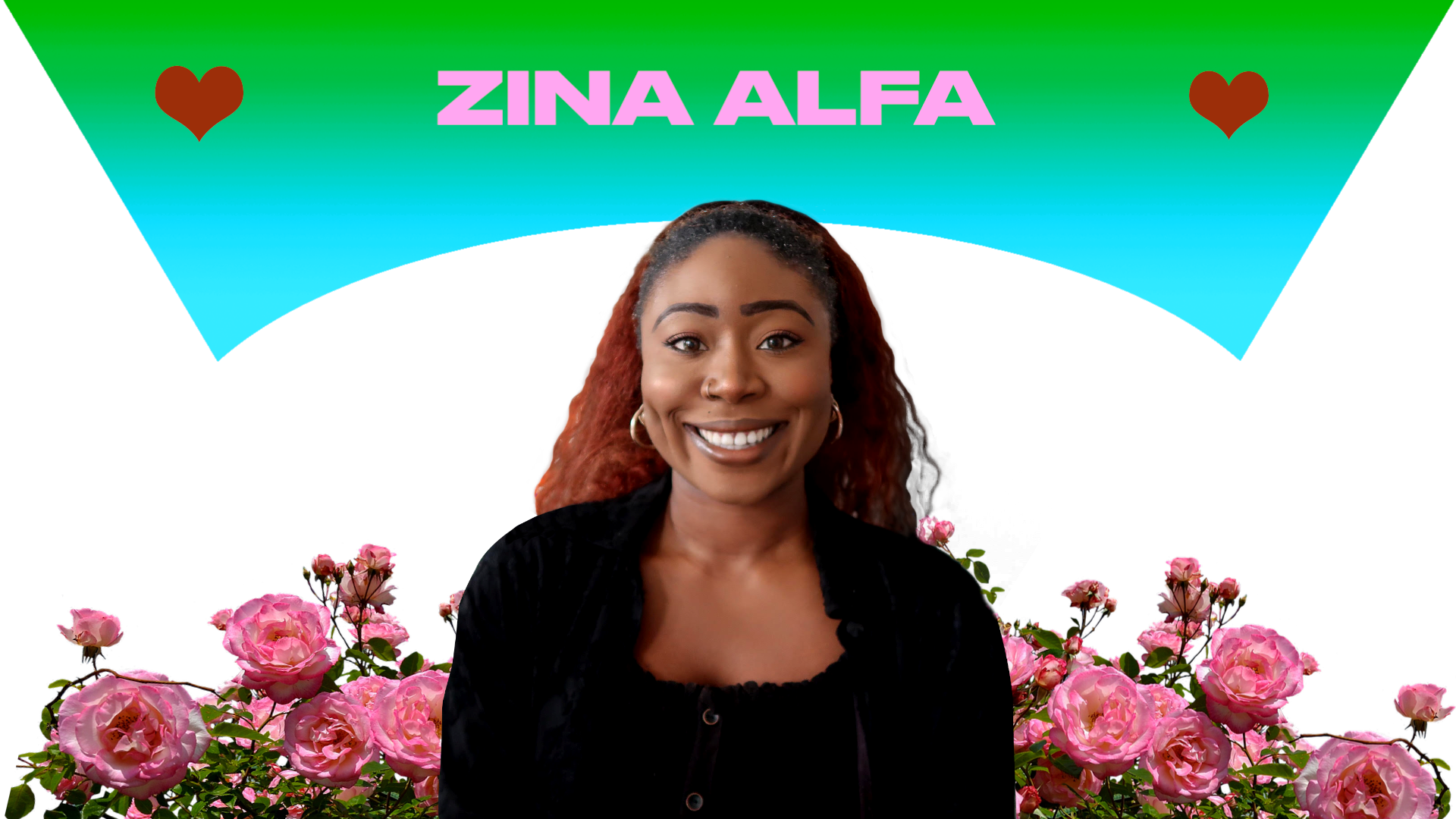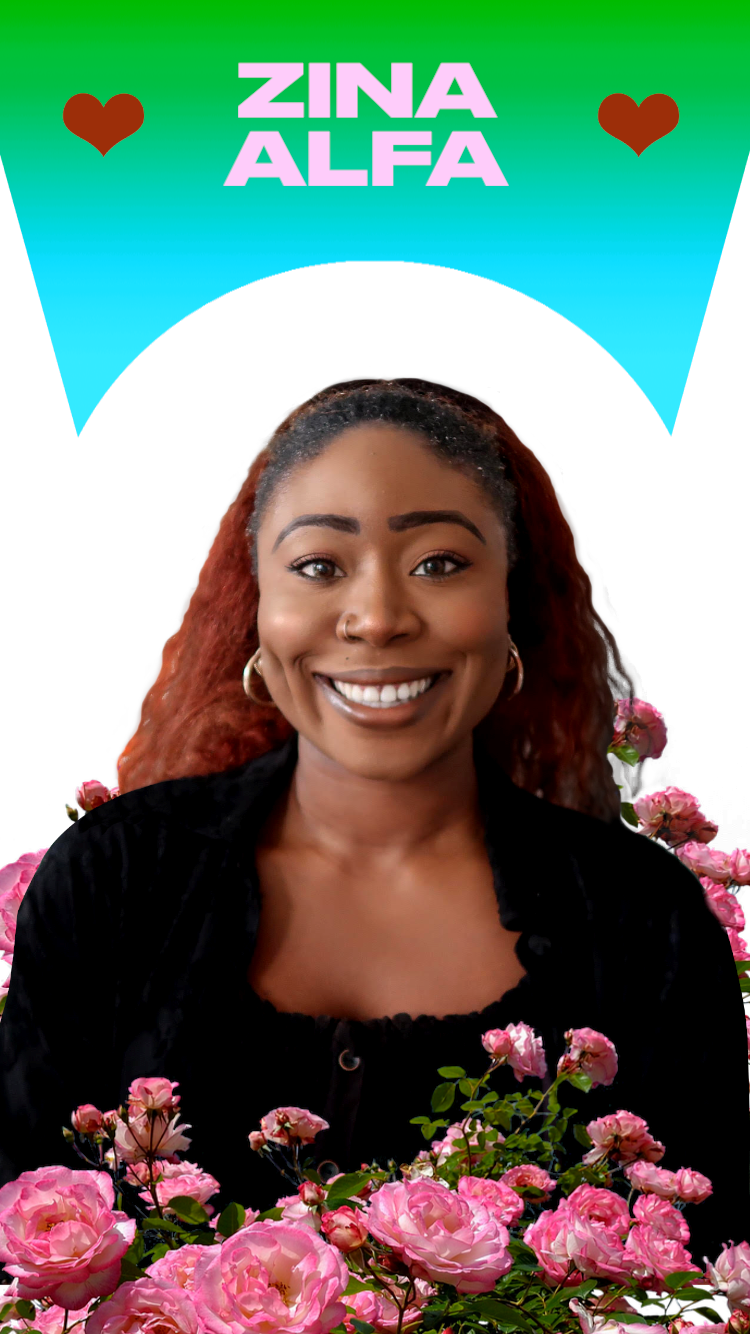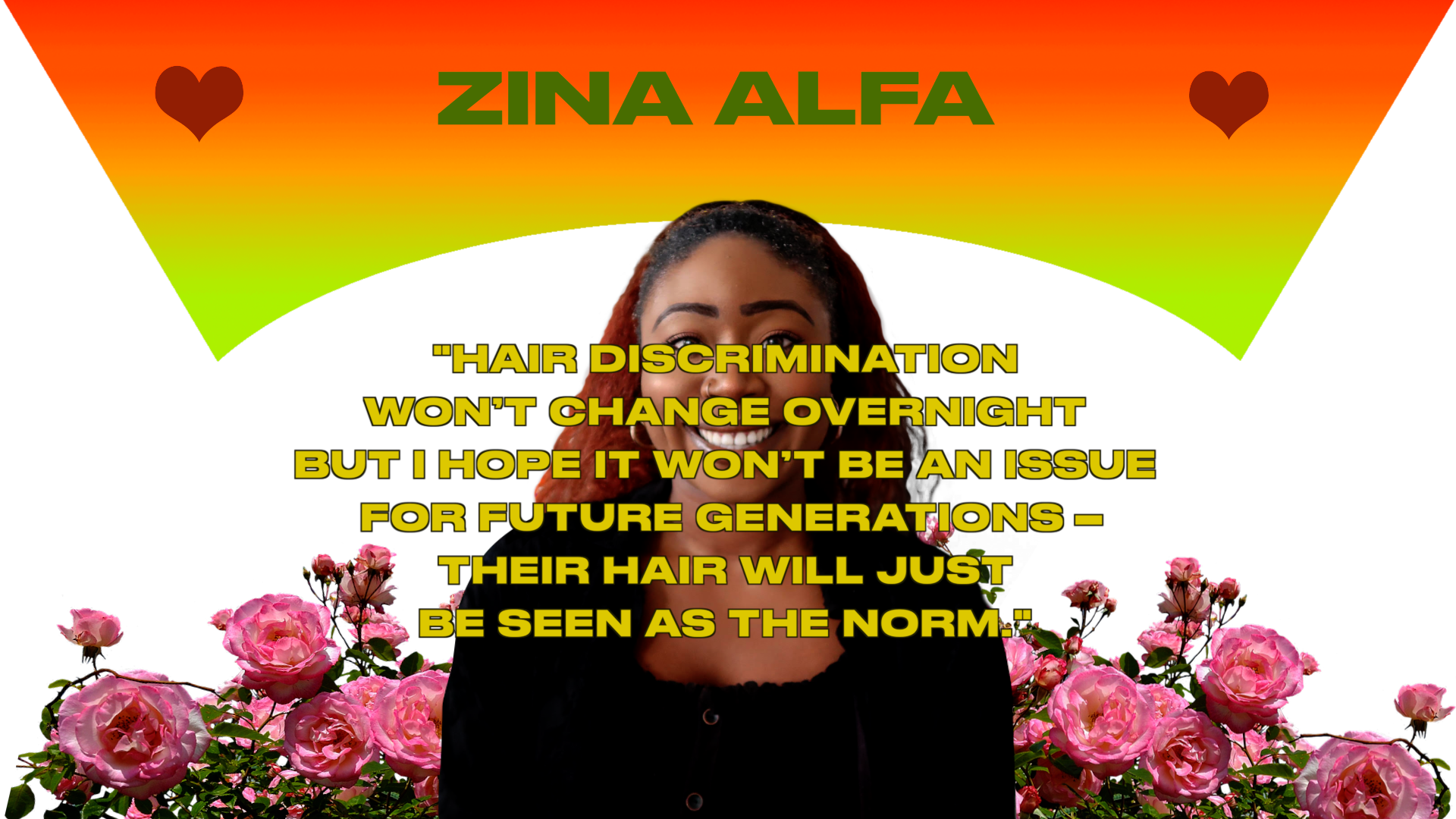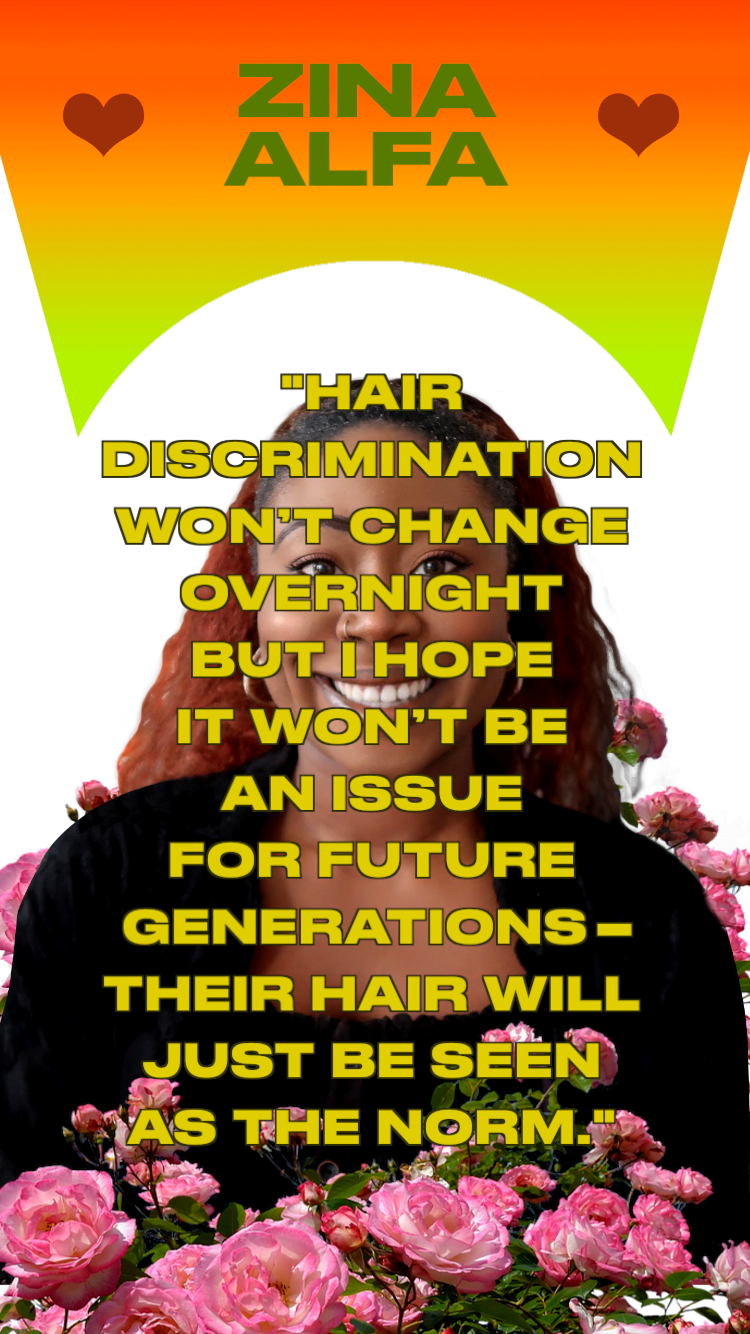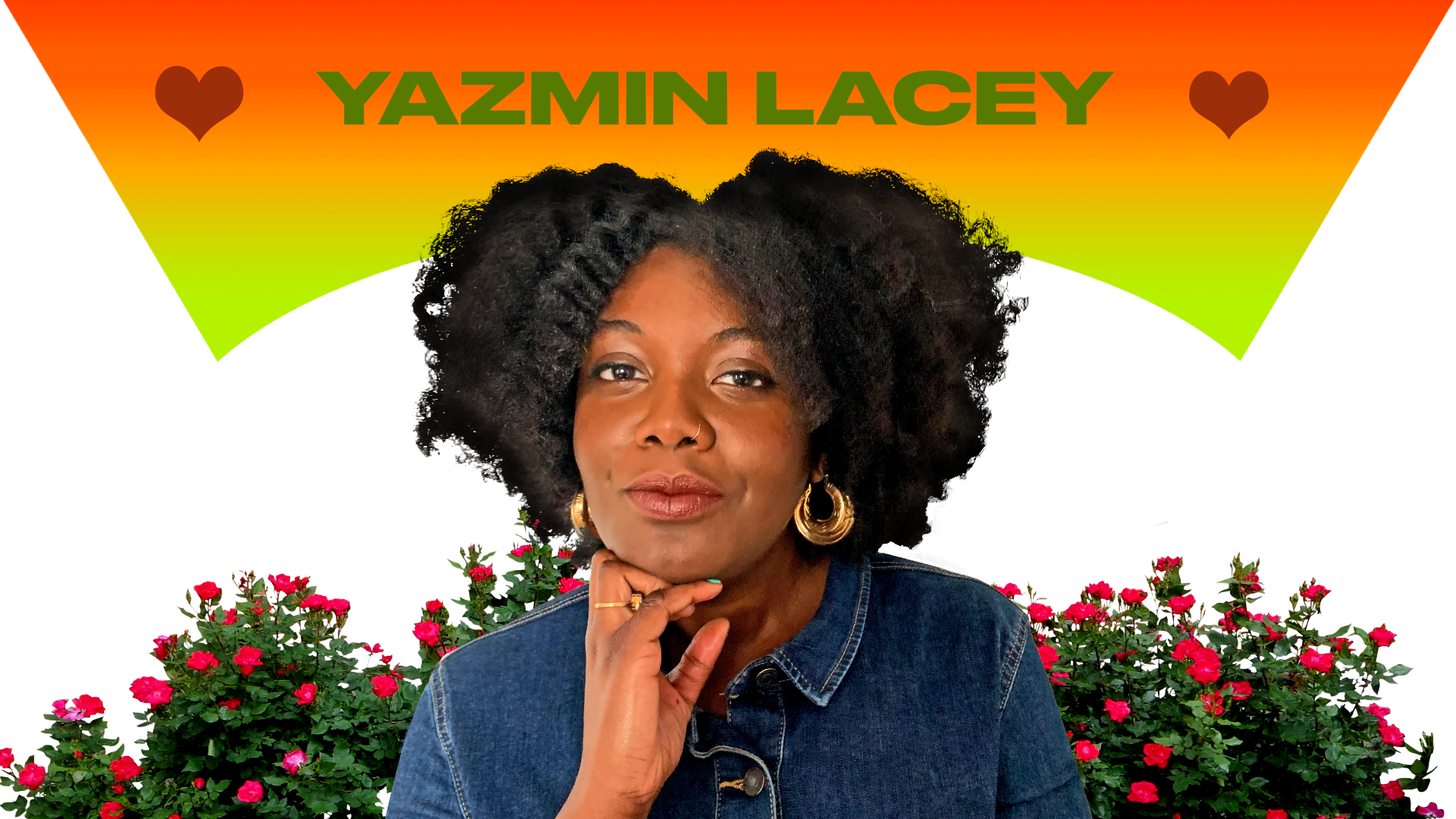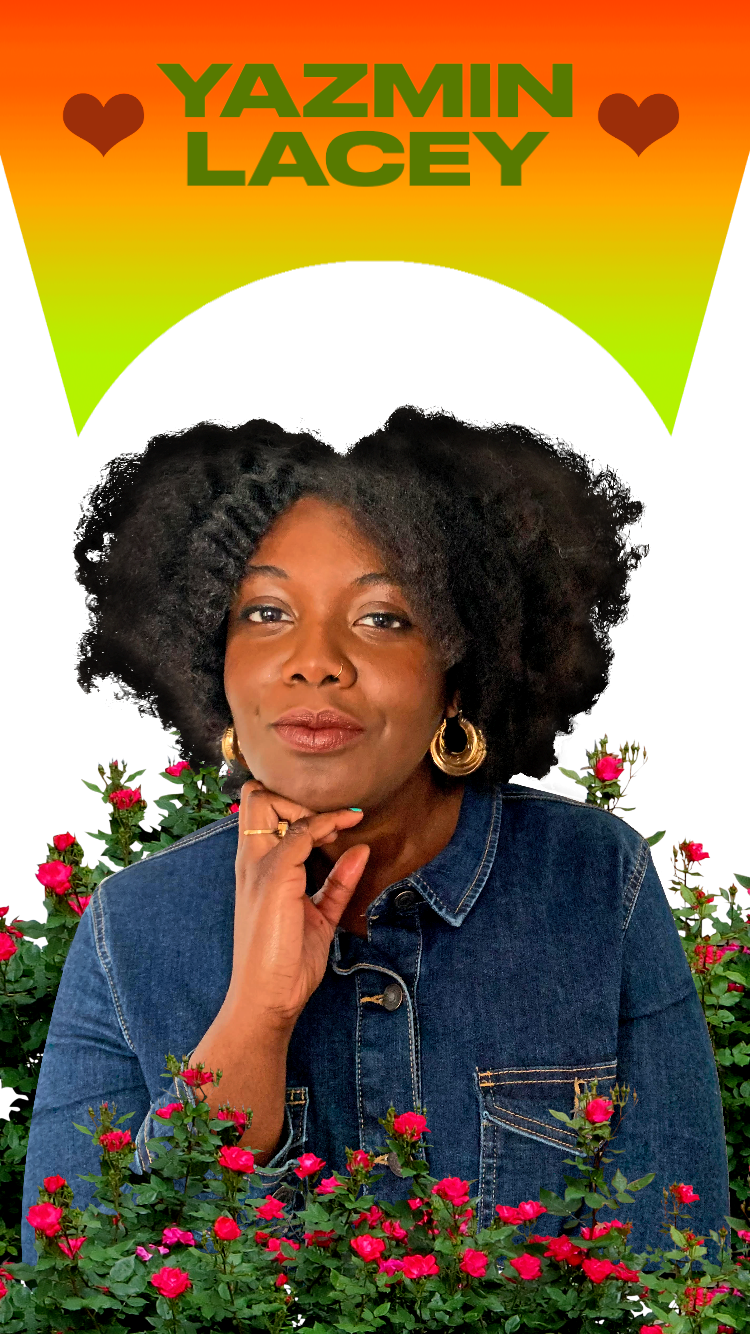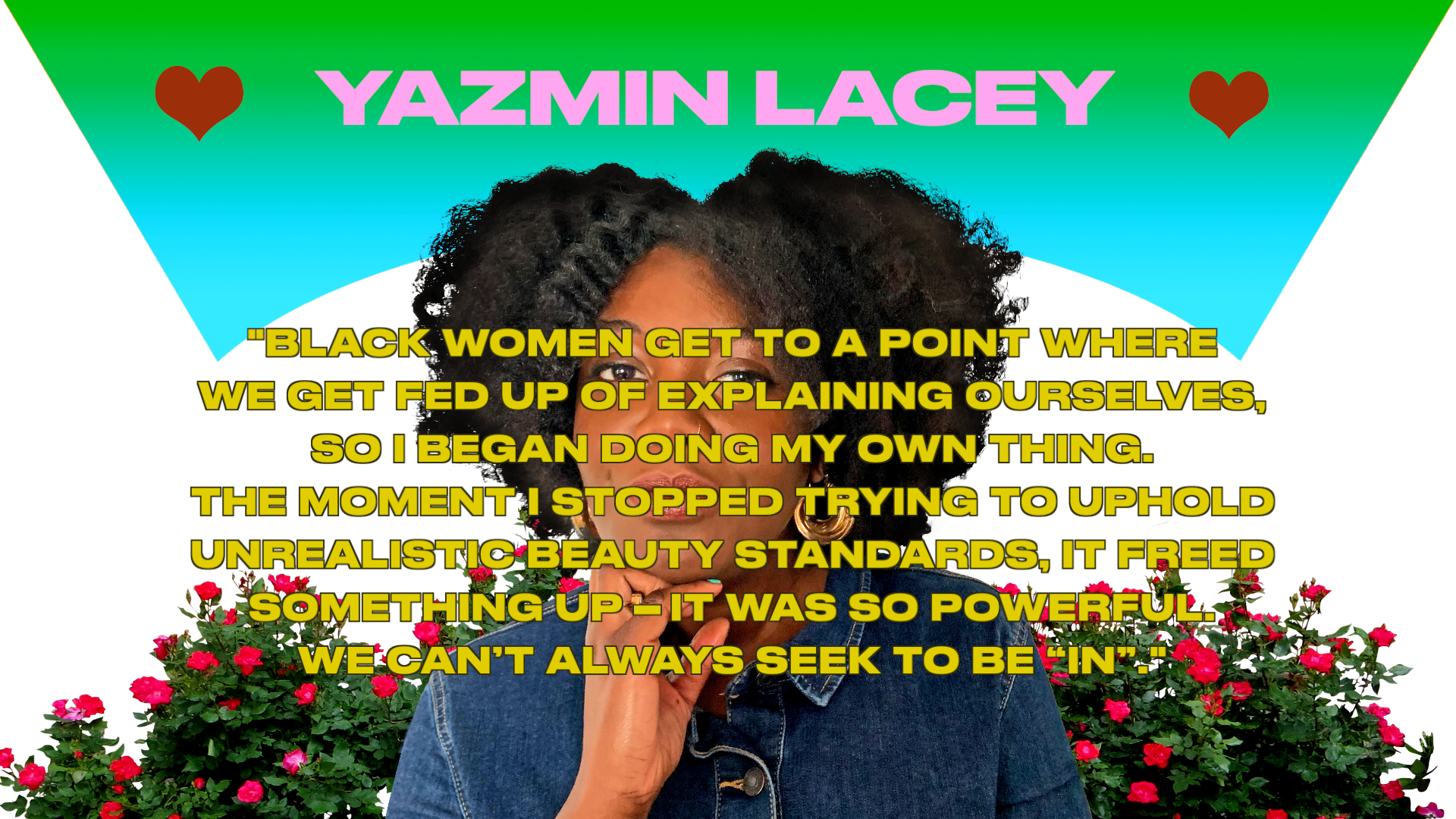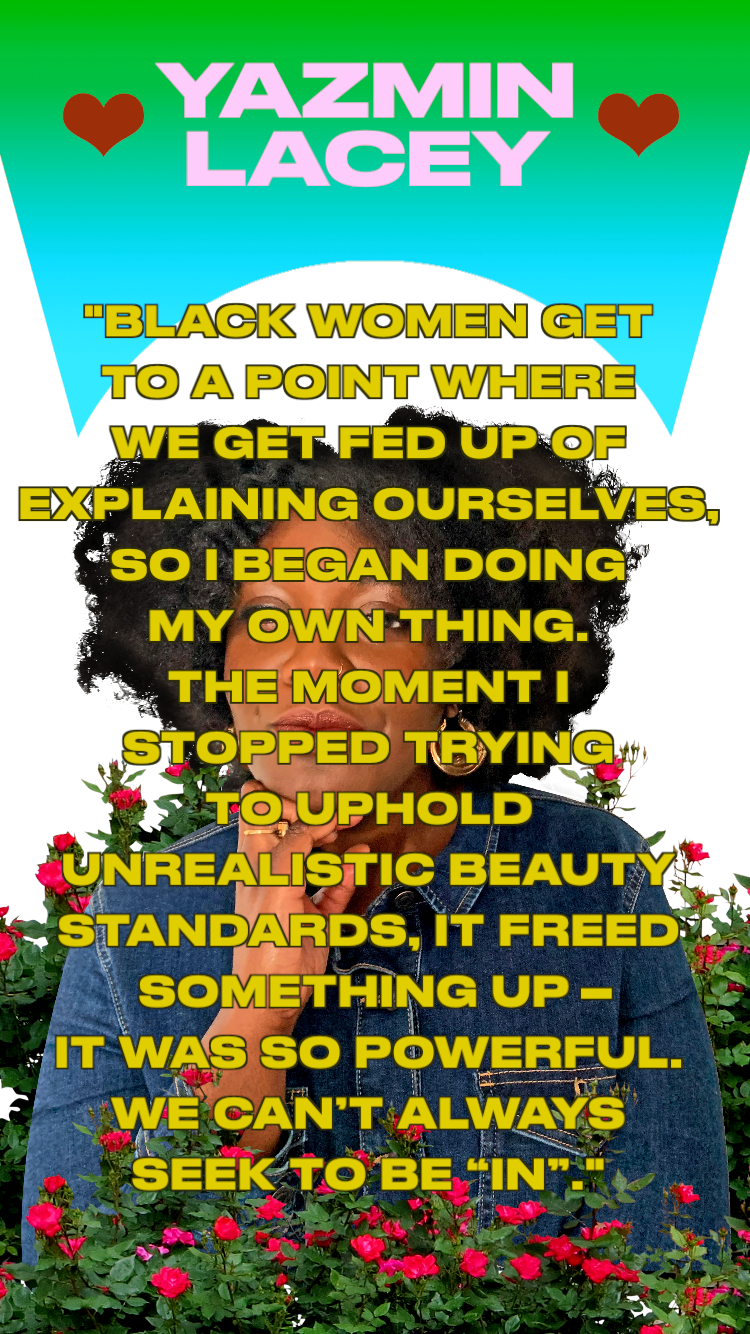Human connection and feeling seen are vital to our sense of self and wellbeing. In a four-part series of virtual heart-to-hearts, and as part of Refinery29’s Self-Service partnership with Dove, we’ve connected like-minded women to discuss beauty, body image, identity, visibility and activism in relation to self-esteem, to show the deep connection and wisdom that can come from speaking honestly about our experiences. In part four, Zina Alfa and Yazmin Lacey meet on a video call to discuss hair discrimination in the UK.
Our hair forms an important part of our identity but for Black women, hair discrimination is a deep-rooted issue. Dove are committed to ending hair discrimination and co-founded the CROWN (Creating a Respectful and Open World for Natural Hair) Coalition and the CROWN Act to help end Black hair discrimination in the US through legislative advocacy and societal change. Our UK laws may be different, but Dove are taking action here too, by supporting petitions to amend the UK Equality Act and creating a new workshop as part of the Dove Self-Esteem Project, designed to tackle hair discrimination, especially for Black girls.
AdvertisementADVERTISEMENT
In May 2019, hair activist Zina Alfa launched a petition to ban hair discrimination in the UK after experiencing several traumatic experiences herself. The multi-talented producer, presenter and founder of beauty tech app ub hair is all too aware of the racial hair bias that Black women experience and is committed to changing the narrative. “I've always stood up for things that were really important to me even if it got me into trouble,” she tells musician Yazmin Lacey, “but I would never want anyone else to fail or be discriminated against simply because of their hair.”
From a young age, Black people rarely have the privilege of not having to worry about how society views their hair, but both Zina and Yazmin now have the confidence to wear their hair however they want. While singer-songwriter Yazmin Lacey uses her soulful voice in music, she is also a vocal advocate for natural hair and the freedom of choice. Having worked as a youth worker before going into music, she knows how a lack of representation and unrealistic beauty standards can negatively affect our self-worth but is passionate about women celebrating themselves and being their most authentic selves.
In this heart-to-heart, Zina and Yazmin share their experiences on the effects of hair discrimination, navigating life as Black women and how loving yourself first is crucial for self-esteem.
Yazmin: Hey Zina, lovely to virtually meet you.
Zina: You too! I’ve been listening to your music to get me through lockdown.
AdvertisementADVERTISEMENT
Yazmin: Thanks! Obviously, I’ve signed your petition to ban hair discrimination in the UK, but what made you start it?
Zina: A police officer friend of mine told me that lots of young Black girls were being excluded from school but confusingly, they were also the highest achievers. After some digging, he found that it was because of their hair. I went to a predominantly white school and I chemically straightened my hair but when I was about 12, I went in with braids. My maths teacher said my hair was disgusting and against school policy which was traumatising and I didn't get braids again until 2018. It left a long-lasting effect on me and my relationship with my hair. I started talking to others who experienced the same thing and thought, “OK, that's it!”. So, I started the petition and made educational videos about the history of Black hair because it's really important that education comes into the conversation. People won’t change or listen if they don't understand what the problem is. Historically, so much has been taken away from us, so it’s really important that we are protected.
Yazmin: I was really happy that you mentioned education. Before starting in music, I worked with young people and I found that a lot of those Eurocentric ideals are pushed onto us really young which leads to insecurities and wanting to shrink yourself. I had similar experiences to you, moving from primary school to a less diverse secondary school. I refused to have braids as a kid because I found it too traumatic to deal with all the questions. I used to chemically relax my own hair, which is wild when you think about the damage at such a young age.
AdvertisementADVERTISEMENT
Zina: Have you gotten braids since as your self-confidence grew?
Yazmin: Yeah and self-confidence helped because I started looking at what was best for my hair. I enjoy having my hair as it is and I want people to embrace theirs too, but I hate that we have this pressure to be one thing or another. We can experiment and do so many things with our hair but a lot of my friends have shaved their heads because they don't want to deal with the fuss that their hair creates from others. Do you feel that ideas about hair and how it should be, are linked to how women are viewed in the world?
Zina: One of my biggest insecurities growing up was being seen as too feminine. As Black women we’re told we’re too aggressive when being assertive or criticised for our hair. The language used to discuss our hair is to manipulate and perpetuate a feeling of not having any self-worth. It’s interlinked with femininity which stems from slavery. When slaves were first brought from West Africa, they kept us down to break the Black woman. It's up to us to change that narrative and we have to think about all the positive things about our hair and all the amazing things that it does. It defies gravity — it grows out like a tree. For centuries we've been lifting up society and we need to start valuing ourselves. As Black women, we often have to bear the burden of so many different things and I'm sick of it.
AdvertisementADVERTISEMENT
Yazmin: Social media helps in some respects. It’s really refreshing when I come across a young woman who reinforces the ideals and confidence that I have. I'm able to see myself and for younger women, it's really nice to have those examples and people who can discuss shared experiences online. We’re empowering ourselves. Do you feel that your involvement in social media helps or hinders?
Zina: On the one hand, social media has been so amazing for representation and shining a light on different forms of beauty. The problem within our society is if we see a dark-skinned Black woman or a woman with an afro, it's typically a certain kind of afro — it’s not actually our natural hair. Social media has been really important in changing that narrative and giving people confidence by shedding the light on so many different people. But there is a huge dark side as it tends to represent one standard of beauty. If we keep pushing for conversations like this it will lead to change, but the work doesn’t stop. It's a global conversation that everyone needs to be part of and recognise that how we saw beauty before wasn’t necessarily right. We've seen beauty standards change over the years but we're not seeing enough representation.
Yazmin: I totally agree with you - everyone needs to get involved. Other than signing the petition, what else can people do to help?
Zina: First and foremost, conversations need to be had. Education is major but we should have more people speaking out. It's not up to me to carry the weight of everyone. Companies should also start celebrating Black women and blackness by hiring an expert and ensuring there are policies and a code of conduct to protect people. Black people should be able to express themselves and wear their natural hair however they want. The fact that so many companies don’t allow people to wear their hair in an afro, which is how it naturally grows, is discriminatory. Being in the music industry, how have you experienced colourism and hair discrimination?
AdvertisementADVERTISEMENT
Yazmin: I always do my own hair before photoshoots because I can’t leave it to chance. They’ll say, “You look great so we'll just leave it as it is,” meaning "I don't know what to do with it, so have to leave it as it is.” Hair discrimination is just the tip of larger issues and it’s reflected in music. When it comes to chart positioning and brand work, it’s normally artists with a looser hair texture and a lighter complexion that go further, which is problematic because music isn't something that should be just a visual. That's why I sometimes find social media quite draining because it perpetuates what I'm trying to steer clear of. I was definitely wary of certain things within the music industry and you get to a point where you become frustrated and fed up, so now I just do my own thing because you can't always seek to be “in”. From my hair confidence, I learnt that the moment I gave myself a break and stopped upholding certain beauty standards, I felt free. It’s so powerful and that's what I try and do in my music as well.
Zina: That’s so amazing and inspiring. It’s amazing what you said about not having to always be “in”.
Yazmin: In terms of Eurocentric beauty ideals, with my size, hair and the darkness of my skin, I learnt very early on that people didn't value me. The more I tried to seek validation, the deeper the pain got but I don't need the acceptance because it’s only a barrier between me loving myself. The self-doubt is sometimes still there, I’d be lying if said otherwise but it takes a lot of work. People are so unaware that Black women are shapeshifting in ways they can't imagine, just so that they can keep it moving. Everybody's moral consciousness needs to wake up and there is ample information available in this day and age. If you can Google how to make Caribbean punch or Jollof rice, you can Google how to be an ally.
AdvertisementADVERTISEMENT
Zina: It’s so interesting that you spoke about size because that’s been a huge thing for me. I've got childbearing hips that will bring me a beautiful baby someday but there's this warped sense of what is actually beautiful. It puts pressure on us to look a certain way. What do you do to stay body confident?
Yazmin: I’ve started running which has been a game changer. If you’re plus-sized within sports and fitness, there’s someone saying that “your body isn’t meant for that”. Running feels like a massive rebellion against that and being able to move makes me value my body. I have to give credit to music for a lot of the changes in my self-confidence because it’s a privilege that my sole job is to express myself and relay stories. I can only do that by being authentically myself, which makes me check in with myself a lot — self-awareness helps me to regulate. I also always check in with my Black female friends because they keep me grounded. In a world which is telling you that you’re not good enough, you just need to speak to people that get it. My dad always says, “don't watch for nobody” and it's true. You cannot move forward in life if you are looking sideways at everybody else. Any time you're focusing on somebody else, you're taking away from the energy that can improve or love yourself.
Zina: There’s a reason our bodies are shaped in a certain way, which people don’t value. The reason our hair grows outwards is to protect us from the sun. We have low porosity hair to cool us down when it gets wet in hot temperatures. No one would know that unless you do your own research when you start finding out for yourself, that's one thing.
AdvertisementADVERTISEMENT
Yazmin: That’s what makes me sad. When we’re young and disillusioned by all of this, we’ve got so much work to do independently which annoys me. Black children are still children and we wouldn't expect them to understand certain social complexities at such a young age.
Zina: I completely agree. I was definitely aware of my blackness by age three. There used to be black and white squares on the floor outside the supermarket and one of my earliest memories was jumping on the white ones because I wanted them to turn me white.
Yazmin: That breaks my heart. As Black women, we have to be kind to ourselves because it’s really shameful and embarrassing to think back. I’ve let that shame go because I've realised where that came from. Children need a supportive, nurturing community around them filled with love. If we don’t get that, we try and emulate things that would bring us that love and security, like a survival mechanism. I read on your Instagram that you wanted to turn your pain into purpose and I fell in love with that. It’s traumatic to think back but we have to keep going. Being our authentic selves is one of the biggest rebellions and I'm glad that we get the opportunity to have conversations like this that feel so liberating.
Zina: I’m really trying to stop talking so negatively about myself. One of the biggest breakthroughs was realising that almost all of my issues have come down to the colour of my skin and my hair. I didn't understand why all of these things were happening to me; having to constantly keep pushing on all those barriers to entry is a lot and affected everything from my relationships to working environments. I have had to create my own life and business. And even then, people still try to battle with me - how are you still behaving this way when I'm the boss?! But it's something that you just have to keep pushing because it's never finished.
AdvertisementADVERTISEMENT
Yazmin: Even though the journey is so long, you have inspired so many people and changed the way they think - never underestimate those small things as well. When I was at school, we didn't have someone like you saying these things. We have to keep going and sometimes it's incredibly tiring but you have to always be kind to yourself. You can’t help the world from an empty cup so we have to check in with ourselves first.
Zina: I feel like I'm going to cry! It makes me feel so happy to hear that. It isn’t going to change overnight but it will happen. The technological age and lockdowns have been really beneficial for a lot of Black people because it's shed a light on so many things. It's enabled us to actually grow and kind of flourish in ways in which we might not have been able to flourish before. Obviously, it's been awful because lots of people have lost their lives but, we're now able to have conversations like this.
Yazmin: I think about the generation before us and they fought against things because they were dissatisfied. We’re still dissatisfied but dissatisfaction is good because we grow from it. Celebrating your hair and having fun with it also has a really strong sense of resistance. I just want to enjoy my hair in all its forms. We have to entirely accept ourselves before anyone else is going to, which is why I think the positive messages in these conversations needs to keep going. How do you keep your self-esteem intact?
AdvertisementADVERTISEMENT
Zina: Having self-care days and not doing anything on Saturdays because the week is usually quite busy. I also have affirmations on my wall. My favourite is "I trust myself and my decisions”. If you trust and do what's right for you, you’ll live your most authentic life and be more empowered. Following other people often makes you fall behind. Knowing that I have the opportunity each day to do something for myself and to be myself is ultimately the best thing to keep me happy.
Yazmin: I try to limit my time on social media. Whether you have a healthy relationship with it or not, sometimes I am just posting a picture to get a compliment as there’s a form of gratification that comes with posting. Now I take loads of pictures of myself not to share but when I’m having a down day or my hair isn’t done, I look at the photos and think “yes, girl!”. A morning routine is also so important. Whether it’s journalling, exercising or eating breakfast mindfully, doing something for yourself is a good way to set yourself up for the day. I'm just writing my album and the song I'm finishing at the moment is about speaking to your younger self. I’d tell myself that I am enough. There is no one else like you and that’s your power. Being yourself is the one thing that sets you apart from everybody else and there’s a sort of comfort that comes with that. Everything else is beyond my control. What would you tell your younger self?
AdvertisementADVERTISEMENT
Zina: Things were so chaotic and I struggled with my identity growing up, so similar to what you said. I’d tell myself that being different is a superpower and the things that you think are bad about yourself are actually the best things. Being British and Nigerian is amazing because there’s so much sauce! I can take from two different cultures. I’d also tell my younger self that you have the power to create and do anything that you want to — don’t let anyone or anything stop you. It doesn't matter if you're Black or a woman, just love yourself and that will make you stronger.
Yazmin: Honestly, it’s been really nice to be involved in something that doesn’t feel tokenistic which has opened up a genuine conversation because those situations are few and far between sometimes.
Zina: Thank you too. It’s been nice to virtually meet you and I’m sure we’ll stay in contact.
Yazmin: We’ll see each other when the world opens up again.
AdvertisementADVERTISEMENT


